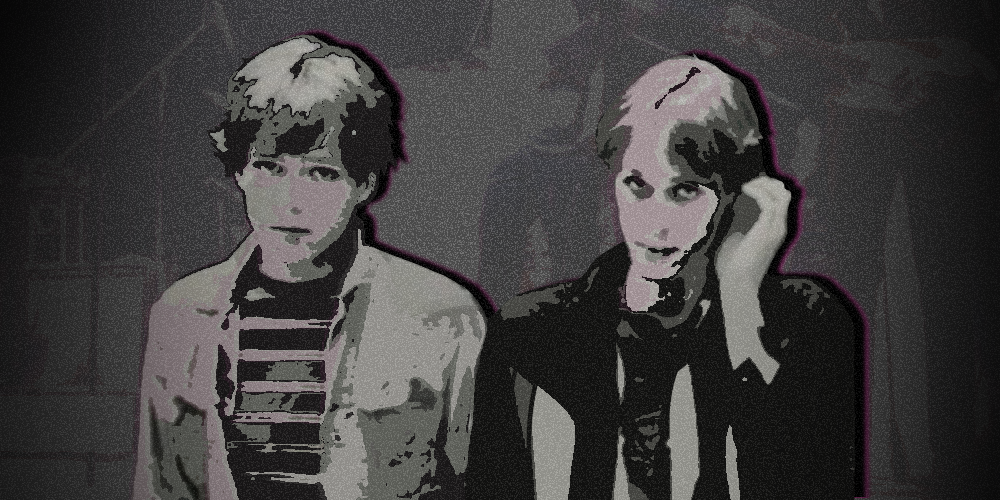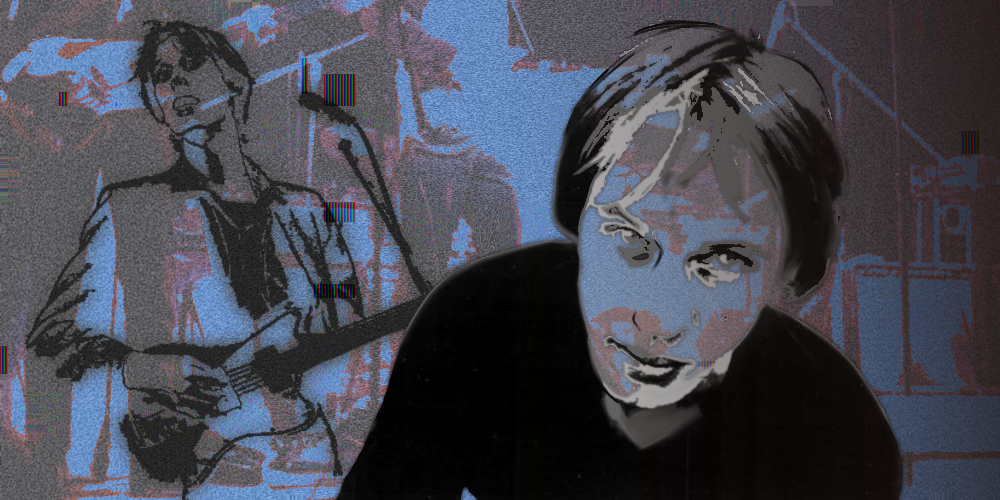To my rue, I wasn’t very adventurous in High School. My rebellions and transgressions tended to be mostly internal, generally taking the form of skipping gym class to go to the library. It felt a little extra wicked to discard my homework and dive into back copies of Rolling Stone and anthologies of rock criticism. I remember being fascinated with Legs McNeil and Gillian McCain’s seminal Please Kill Me, an oral history of the bands within the CBGB’s scene in mid-seventies New York, which by all accounts was a hell of a time to be living in Gotham city, let alone to be playing music. It still kind of boggles my mind to think that you could see The Ramones, Patti Smith, The Talking Heads, The New York Dolls, and Blondie not only at the same club but sometimes on the same bill.
A wide-eyed, polo-shirted David Byrne would strum twitchily on an acoustic guitar and sing about psycho killers and buildings on fire and be opening for The Ramones. Or Debbie Harry would grin in her fabulously poised way before giving way to the raucously triumphant anthem “Sonic Reducer” courtesy of the young loud and snotty The Dead Boys, which is still guaranteed to strip the paint off the walls if you play it loud enough. There are plenty of wonderful bands that made their mark on that once hallowed ground — I never actually made it there, but by the turn of the century, every New Yorker I knew predictably scoffed at what it had become — but the CBGB’s band who captured my heart the earliest, longest, and deepest is definitely Television, whose lead singer and songwriter Tom Verlaine passed away earlier this week.
I first bought a copy of Marquee Moon, Television’s universally acknowledged masterpiece, after reading about their reputation in McNeil’s book and British journalist Nick Kent’s ecstatic review. I admit that I totally didn’t get it at first. That’s often how it is with great art; it doesn’t (and maybe shouldn’t) connect with you right away just because you haven’t yet adjusted your personal antennae to receive its eccentric signal.
The trick is not to give up and defensively assume that it sucks, which is so easy to do in a market-based culture of instant gratification. Sooner or later, it just might work its magic on you, and alter the way the world looks and feels a little bit. And somewhere about the third or fourth listen it all suddenly clicked; the air felt a little differently charged. Hearing the sad news about Verlaine I realized that I’ve been listening to that record for twenty-five years now and I still fall gratefully back into those well-worn grooves every time.
“See No Evil” starts things off with a gnarled, neck-snapping guitar riff that sounds a little like an early Rolling Stones tune goosed by a current of nervous energy, and Verlaine’s nasally cocky vocal lays it all out for us: “What I want, I want now/ And it’s a whole lot more/ Than anyhow//I get ideas, I get emotion/ I want a nice little boat/ Made out of ocean// I understand all destructive urges/ It all seems so perfect/ I see/ I see no/ Evil” and then we’re off. The chorus is boosted by the pealing backing vocals, and the melody carries a lip-smacking relish in the poetic debauchery it’s proudly advocating.
Delaware-born Verlaine didn’t take up the name of an infamously decadent French Symbolist poet for nothing. It sure sounds better than his birth name of Miller and besides, it fits with the name of his band. It’s another interesting example of how punk rockers like to change their names. It’s got a little of the Nietzschean insistence on making one’s life into a work of art, a cheeky form of self-promotion, and a little like joining a cult. Then again, it’s hard not to get behind an exuberant line like “pull down the future with the one you love.” Which is pretty much what the whole CBGB’s gang was doing, whether they intended to or not.
You can hear the strut and swagger in “Friction,” which thumbs its nose at the world’s squares and bores and proudly declares “I don’t wanna grow up/ It’s too much contradiction/ and too much/ Friction.” That sounds like a pretty classic line for a rock and roll tune, almost as perfect as crooning about falling into the arms of Venus De Milo, as he does elsewhere. Yet at the same time, we should remember that this is no idle boast. Verlaine had not long ago run away from a posh High School with his best friend, and later frenemy, Richard Hell (Nee Meyers) all the way to the legendary land of New York City in order to live hand to mouth while becoming poets and writing songs.
Many are called to such bohemia then and now, but few are chosen. For one thing, it’s pretty much impossible to pull off that kind of lifestyle in the Big Apple these days, or anywhere else for that matter. A line like this isn’t just posturing, or if all performing is posturing to some degree, then that chin-jutting defiance is more like method acting. After all, the guys from Television had talked the owner Hilly Kristal into putting them on in the first place, amusingly bluffing about being a country/bluegrass band, to play for nothing in front of whatever derelict crowd happened to wander in, and literally built that stage.
Then there’s the powerful, idiosyncratic, majestic title track. This is the band’s magnum opus, though the epic live staple “Little Johnny Jewel” comes close. The opening riff is all jangled nerves, part police siren and part psychedelia, yet the bass and drums lend it an almost reggae-like steady heartbeat, and as we let the rhythm sink in and start slowly nodding along, Verlaine starts bleating about mysterious Cadillacs in graveyards and how Broadway looks so medieval and listening to the rain while hearing something else.
It’s those lengthy, trilling, angular solos, courtesy of Verlaine and Richard Lloyd, the underrated contributor to all these songs. They trade licks like the sax players they adored, steadily raising the stakes without losing the groove. Those long, thin, talon-like fingers you see on the record cover, where the band looks like they’ve just been yanked out into the light after months spent lurking in an underground lair (which probably isn’t far from the truth, though in actuality it was probably a loft) wring notes from the strings that none other than Patti Smith compared to the screaming of bluebirds. She and Verlaine were lovers, then comrades, and she held his hand in his last days.

There are certain notes that Verlaine and Lloyd each hit that still make the hairs rise on my arm every single time I hear them, no matter how many times I listen. And when the song gradually builds to this pounding, relentless, magisterial climax, where the whole band is seemingly hitting the same thunderous notes at the same time, and they keep ratcheting up the tone and the tension, until you think you can’t go any farther, and they hit the right part of the scale, and then you’re somewhere else entirely, the notes floating, twinkling idly like a sky full of stars. And — after a theatrical pause — we land right back into that insistent beat and ride it all out. It’s no wonder that those who saw them live when they could really stretch out, unencumbered by the limits of album length, walked away stunned.
Jim Jarmusch, who certainly knew his way around that particular scene, once remarked that he always thought that there was something French about Television. That can’t just be because of the lead singer’s name. I see it, too, I think. Maybe it has something to do with an enigmatic and subtle elegance, a bit of private melodrama that is only hinted that beneath all the raggedness and the grit — you have to listen closely to notice. I catch it in the lovely “Guiding Light” when he laments about him and his lover parting like the seas as the melody drifts poignantly away from the vocal, or in the anguished way the guitar quivers towards the end of “Torn Curtain.” For all their rough and ready swagger, Television possessed an exquisite sensitivity — a rare thing in punk rock.
I’ve recently decided that my two favorite genres of music are jazz and punk. Jazz keeps you on your toes: it takes incredible finesse, technical virtuosity, exquisitely tuned nerves, and continual practice to do it well and avoid an utter catastrophe. Suffice to say, punk doesn’t, which is what makes it so wonderful in its own way. You might even say that punk revels in catastrophe. It’s not that you don’t need a certain kind of talent to play it, to be clear, but the virtue of punk rock is that you can just let it rip.
Television combined the raw energy of punk with the ecstatic riffing of jazz in a way that I wish more bands tried to do. If you can combine Coltrane’s spiritual intensity with the Yardbirds’ sweaty rave-ups, as Verlaine brilliantly did, you could really have something special. Television’s tremendous influence, as evidenced by the many heartfelt tributes that have popped up everywhere, testifies to the fact that Television was able to achieve something especially inspirational for being so rare.
It’s a little disappointing, but undeniable, that Marquee Moon is as good as it gets. Their sophomore record Adventure is perfectly solid, and some of the bootlegged live cuts are superb, but it must be said that Verlaine never hit the same heights again. A pity. But we should be grateful for what we do have. It reminds me of what Joseph Heller once said when someone mentioned that he never wrote another book as great as Catch-22: “yeah, well, neither has anyone else.”•




